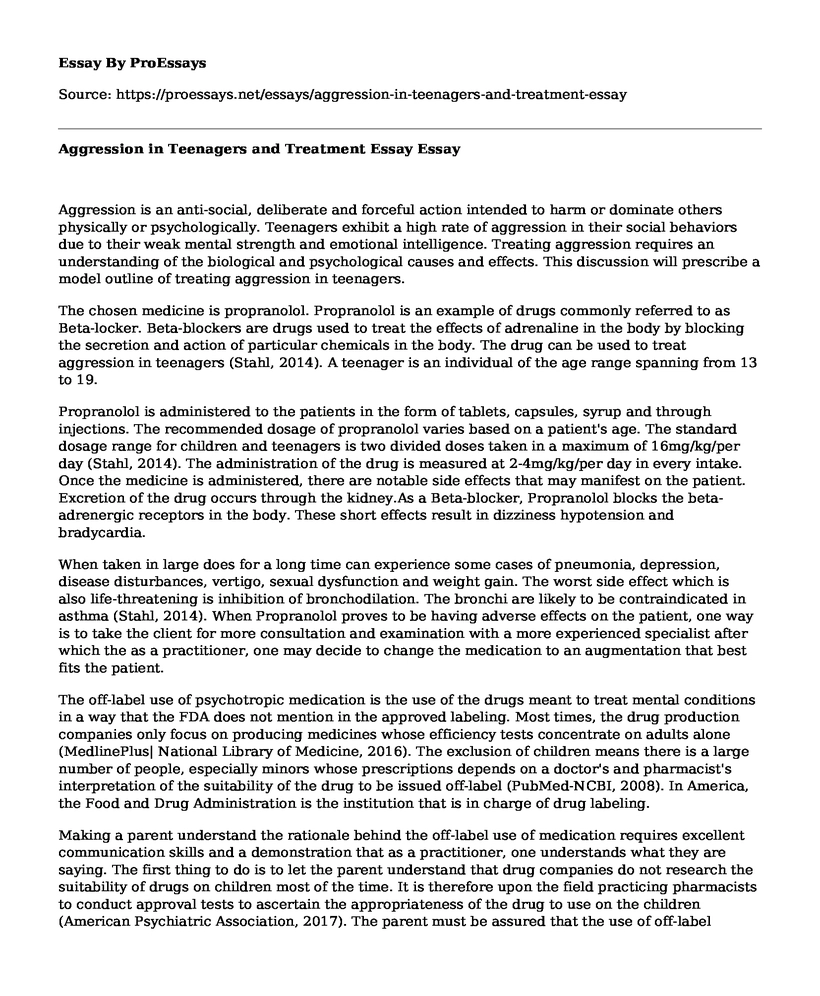Aggression is an anti-social, deliberate and forceful action intended to harm or dominate others physically or psychologically. Teenagers exhibit a high rate of aggression in their social behaviors due to their weak mental strength and emotional intelligence. Treating aggression requires an understanding of the biological and psychological causes and effects. This discussion will prescribe a model outline of treating aggression in teenagers.
The chosen medicine is propranolol. Propranolol is an example of drugs commonly referred to as Beta-locker. Beta-blockers are drugs used to treat the effects of adrenaline in the body by blocking the secretion and action of particular chemicals in the body. The drug can be used to treat aggression in teenagers (Stahl, 2014). A teenager is an individual of the age range spanning from 13 to 19.
Propranolol is administered to the patients in the form of tablets, capsules, syrup and through injections. The recommended dosage of propranolol varies based on a patient's age. The standard dosage range for children and teenagers is two divided doses taken in a maximum of 16mg/kg/per day (Stahl, 2014). The administration of the drug is measured at 2-4mg/kg/per day in every intake. Once the medicine is administered, there are notable side effects that may manifest on the patient. Excretion of the drug occurs through the kidney.As a Beta-blocker, Propranolol blocks the beta-adrenergic receptors in the body. These short effects result in dizziness hypotension and bradycardia.
When taken in large does for a long time can experience some cases of pneumonia, depression, disease disturbances, vertigo, sexual dysfunction and weight gain. The worst side effect which is also life-threatening is inhibition of bronchodilation. The bronchi are likely to be contraindicated in asthma (Stahl, 2014). When Propranolol proves to be having adverse effects on the patient, one way is to take the client for more consultation and examination with a more experienced specialist after which the as a practitioner, one may decide to change the medication to an augmentation that best fits the patient.
The off-label use of psychotropic medication is the use of the drugs meant to treat mental conditions in a way that the FDA does not mention in the approved labeling. Most times, the drug production companies only focus on producing medicines whose efficiency tests concentrate on adults alone (MedlinePlus| National Library of Medicine, 2016). The exclusion of children means there is a large number of people, especially minors whose prescriptions depends on a doctor's and pharmacist's interpretation of the suitability of the drug to be issued off-label (PubMed-NCBI, 2008). In America, the Food and Drug Administration is the institution that is in charge of drug labeling.
Making a parent understand the rationale behind the off-label use of medication requires excellent communication skills and a demonstration that as a practitioner, one understands what they are saying. The first thing to do is to let the parent understand that drug companies do not research the suitability of drugs on children most of the time. It is therefore upon the field practicing pharmacists to conduct approval tests to ascertain the appropriateness of the drug to use on the children (American Psychiatric Association, 2017). The parent must be assured that the use of off-label medication neither contravenes medical ethics nor does it compromise the safety of the child (PubMed-NCBI, 2008). It will need the presence of fellow practitioners for the parent to understand that the assurance is genuine.
Conclusion
The use of off-label medication in clinics and hospital is a justified form of medication because the medical practitioners understand the drugs and their effects on the human body. Desisting from the use of off-label medication would disadvantage a large population of patients described as special cases (PubMed-NCBI, 2008). The clinics are highly controlled environments under the supervision of specialists who can authenticate the validity of a drug before prescribing them to patients.
References
American Psychiatric Association. (2017, June 5). Parental Involvement in Therapy Key to Helping Children with Disruptive Behavior Disorders. Retrieved from https://www.psychiatry.org/news-room/apa-blogs/apa-blog/2017/06/parental-involvement-in-therapy-key-to-helping-children-with-disruptive-behavior-disorders
MedlinePlus| National Library of Medicine. (2016). Propranolol (Cardiovascular): MedlinePlus Drug Information. Retrieved from https://medlineplus.gov/druginfo/meds/a682607.html
PubMed-NCBI. (2008). Off-label psychopharmacologic prescribing for children: History supports close clinical monitoring. Retrieved from https://www.ncbi.nlm.nih.gov/pmc/articles/PMC2566553Stahl, S. M. (2014). Stahl's essential psychopharmacology: Prescriber's guide.
Cite this page
Aggression in Teenagers and Treatment Essay. (2022, Jul 05). Retrieved from https://proessays.net/essays/aggression-in-teenagers-and-treatment-essay
If you are the original author of this essay and no longer wish to have it published on the ProEssays website, please click below to request its removal:
- Benefits of Personality Characteristics and Selfefficacy in the Perceived Academic Achievement
- Comorbidity of Fibromyalgia and Mental Illness - Research Paper
- The Pursuit of Happiness Paper Example
- Essay Example on Prisons Rehabilitation Policy Manual
- Essay Example on the Unfamiliar History of Dissociative Identity Disorder (DID)
- Essay Example on Traumatic Memory: Brain Adjustment to Cope With Traumatic Conditions
- Research Paper on Mental Illness: 500 Million Affected Worldwide







